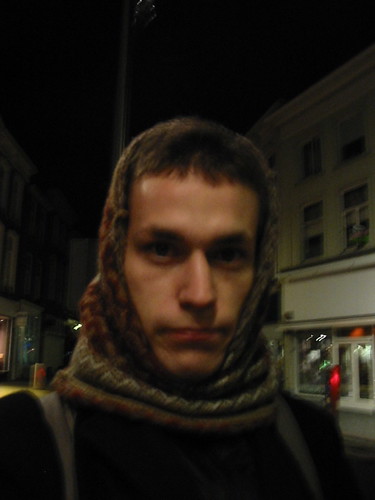My love...





I shouldn't have chose to spend christmas alone, to walk alone, to dance alone, talk alone, sing alone, cook alone, to take photos alone... for a more hedonistic purpose: New Years Eve at NOW & WOW.
I felt guilty in a way and decided to do my time.
So I dedicated myself to music production, and 4 new Ana tracks were conceived during this hollidays.
So I designed the sketch for a publication that will be available in a few weeks here in Holland and in the end of January in Portugal.
And I also re-wrote something (please pardon all my typos):
Ideas for free! - We are now dealing with one of the most delicate issues of contemporary society. - I'm going to adopt a baby a tell him about everything I know!
The DJ culture is not so old that one cannot trace its birth with relative easiness. By the beginning of the 1980's decade it was already normal that clubs and pubs were organizing parties where live music was being replaced by a kind of entertainment that still depends, on its vast majority, on the edition skills of a single man: the Disk Jockey. In just 20 years the DJ cult has changed from something concerned with small circles of entertainment to some kind of telecommunications business jovial face. Take Optimus Hype @ Meco as an example, a portuguese summer festival sponsored by Optimus (a portuguese telecommunications operator). I guess there's nothing twisted with this. The central theme here is not sponsoring. The big question is much more wide than that, and DJ culture is just an introducing metaphor and illustration to what is slowly happening to other spheres of mass communication.
October, 2005
When someone spots for the first time a small corner inside a bar, next to a whisky and vodka machine, where there is a screen with someone dressed like a bartender touching it every ten seconds someone might think he is checking every order into the processor and calculating bills. I base this premiss on my own cultural background.
There are lights blinking and even smoke machines. Different night, different bar and different people dancing to no DJ. Turns out, besides his drink-mixing skills, the bartender also owns audio-mixing intuition.
In Holland there are around ten big companies that make DJ software. There is an application that works on Windows XP platform and any personal computer with a touch-screen can run it. The interface is very similar to the one from the more known Traktor DJ Studio and not only bartenders are using it. I witnessed already DJs (that is, men that don't serve drinks that night) using it. The companies that sell this services do more than programming, or they would stop getting money after every small dance-entertainment-business bought one copy of its creation. They also establish protocols with the institution that controls copyrights in Holland and every month, in return for specified fees, they mail a new CD-ROM with 400 MP3 tracks to the paying bars. The first doubt that comes to one's mind may be about he nature of software: Is it a set of ideas or is it a material thing? If something was taught to the users this last times, is that a computer generated image, text or video, is as material as the meaning it comes out from a painting, book or film. The fundamental difference is that it can be copied with very little or even no amount of financial investment. Duplicating a file has null costs and tends to be very fast.
As Andrew Brown (November 19, 2005, The Guardian) said:
"In the beginning, computer software was neither patented nor copyright. For so long as the machines had no users, only programmers, this made sense. But in the mid-1970s, people started to see they could make money out of software. This is not easy or obvious, because when I make a copy of your program, you still have the original, which works just as well as it ever did."
Later in the same article he also rephrases Thomas Jefferson statement meaning that when one shares an idea nothing is lost so, naturally, it cannot fit in the same market standards has oil or rice. The logic of economy is the one from trade. It is logical that one gets compensation for losing a bread but not from instant free-cost copying.
Excessive commercial orientated production has shown its claws to the industrialized world in 1929. By that time it happened with material property.
Nowadays the bartender can easily replace the "vinyl DJ". Midi-controler-or-not, playlists-or-not, auto-mix-or-not, random-or-not, everything is possible!-or-not!
It's not possible to play non-authorized songs. And I don't obviously mean author-authorized, but software-company-and-intellectual-property-institution-authorized. Those systems are connected to the internet and content management is enforced from the source. If not, that control is already codified on the software.
Nothing truly dangerous yet, but to a kid that usually goes out on weekends it's already too easy to understand what kind of environment a place normally has just by knowing the brand they use for DJing. "Oh! Fuck... It's Xenox... Lets get out of here." Worse, a regular MP3 CD won't work unless the system is illegally cracked. Even if you want to hear your own music (you produced) and/or the track has no copyright limitation. And if that kind of impediments to free culture are not illegal, they should be.
I predict that in about 9/10 years, a big part of the commercial and underground artists field of action (visit cards, video clips, music production, logotypes, posters, flyers, personal invitations, furniture design, corporate identity, merchandising, clothes...) will have already suffered a gentle but strong turn on the authorship responsibilities. I mean that these kind of products will probably be projected, not by highly particularly trained professionals, but by other workers. Personal secretaries and civil constructors with a little help from the right software and hardware will be able to design proper solutions for particular cases. Type scanners, 3 axis scanners, laser printers, all kind of recorders (...) will allow the middle class person to be so much of a consumer as a producer. Urban landscape will evolve to a point where real time advertising mixes with information, where personal tools have as many communicative power as corporate media interests. Small MP3Player-Digital-Camera-TouchscreenTV-Computer-Telephones with GPS are already connected to the internet through public places access points.
Power VS control.
The individual lifestyle might not permit the actual public of mass communication to identify its own capabilities, and therefore the personal representations will probably be less effective than the collective representations. By the year 2006, more than 50% of the world population is already living in metropolis (cities with more than 1 million habitants). And the a big part of this metropolitan-people hasn't even touched a computer yet. Most of the macro cities are located in underdeveloped countries.
For example, China gigantic concentrations of human beings have just recently started to receive the even bigger amount of innovations that developed civilizations have created in the last decades. Lets not make the mistake of thinking that european, japanese and american cultures are fully aware and in great control of the media society. In fact, changes are less visible in slow motion.
If we combine this facts to the small but effective modifications happening in the name of intellectual property industries' interests, the most objective result will so disappointing as the one predicted by George Orwell in 1984.
Society always needed the feeling that everything is under control to maintain order, and news companies, cannot just tell the people, that the public can say and "write" everything they need to be said and written for them. The list is endless: music, manifests, news, radio and TV programs, web-sites, software, movies, documents, laws and even money. That would simply generate chaos the same way it would happen if the pope came to some balcony and said to a million christians: "God exists only as a concept! You know? Like an idea and even less than a cartoon character..."
The most conscious news and media corporations have definitely no need to bring some light and responsibility to the actual consumer. What most clever cultural content producers are doing, is exactly the opposite: getting the public lazy and comfortable in it's new in-materialism. Cheap fun orientated gadgets, automatic content filters, 100$ Laptops (without Hard Disk what can ultimately get young children used not to record information - for educational purposes - they say), software that installs itself on a computer that prevents copies being made and breaks the machine if an attempt is made to remove it...
Whether it is Sony, the government, a travel agency, or some american cracker mafia gang that ends up working, controlling and owning with the user's tools, doesn't really matter now. What's important is to understand this are changing times. And the time to take reasonable and responsible attitudes is now. Tools are built, we just have to use them for higher purposes that the ones seen in commercials. Allow me to remember that we are dealing with one of the most delicate issues of contemporary society with one perfect example:
"The public project that sequenced the human genome, led by Sir John Sulston and Bob Waterston, defined itself as in opposition to patenting data. This wasn't just an idealistic stance. (...) Sulston now, after his Nobel prize, spends much of his time campaigning for public access to scientific knowledge and its fruits." (Andrew Brown) Now the bird flu virus DNA sequence is available for the public and according to some scientific opinions, it's easier and cheaper to sequence it than it is to build an atomic bomb. It seems scary but that is precisely why there is no point in continuing to fear the unknown, praising the wisdom of the fool procreating happily ever after. 25 000 thousand years ago we were maybe 2 or 3 Homo Sapiens-Sapiens. 50 years ago we were 2.5 billion. We are now 6.5 billion and counting. The good thing is that laziness can go sideways, and the same way it may help controling information, it may stop all nutjobs arround the world from trying to sequence the bird flu virus DNA, or make every one to work a lot and earn a lot money to buy 60 Gigabytes of new audio-tracks. "In the US, for instance, it is illegal to copy your own CDs on to your own iPod. Obviously, this is a law that is broken all the time, or nobody would ever buy an iPod. The 60GB model sells for $350 (£200); to fill it up with freshly downloaded content from the Apple store could easily cost another $25,000."
Even so things are tending to a kind of comfortable fear control. In my opinion, if nothing is done now, the general public of the future will hardly imagine what might have been with a little bit more responsibility before... If you don't believe in me ask that guy in the metro station next, to Ástato projection, uploading images and downloading old-school New Emotion, making a video-clip for Memorex in 2016.
Now I don't feel guilty if there is another snowstorm and people sleep on the streets and outside the club!

This text wasn't finished until I wrote this paragraph. There is one thing I didn't mentioned but I didn't forget. It's Rotterdam. Rotterdam is different from all the other cities in Holland. Most people say it's grey, and ugly and that it has the highest criminality rate in Holland and I still feel safer there. Most people say it has one of the worst art and design schools I could go here in Holland. "Willem de Kooning!!? There was evaluation of schools made some time ago and that school was one of the worst! Den Bosch it's lecker!" Maybe you have the best architectural environment in Holland and the best conditions, and more and better work space, and more freedom and innovative teaching systems. But what does that worth if you don't share your life outside it... Because of my old good friend Meinhard, Rotterdam was the place for me to be in Holland.
Have a nice 2006!

0 Comments:
Enviar um comentário
<< Home